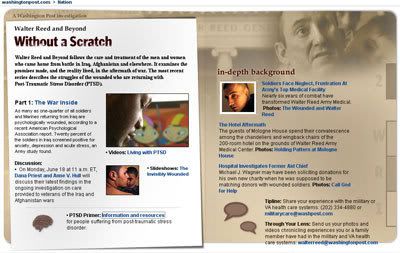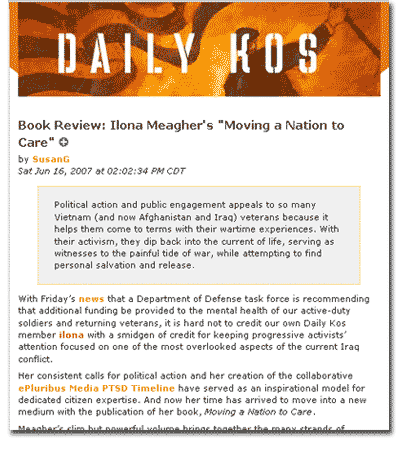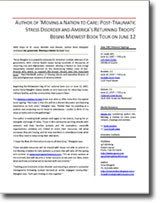Alternative Sentencing Considered for Minnesota's OEF/OIF Veteran First-Time Offenders
From the Pioneer Press:
[Guy] Gambill, an Army vet whose younger brother recently wrapped up two tours in Iraq, wants Minnesota to adopt a law passed in California last year that provides alternative sentencing other than jail for first-time, nonviolent offenders who are combat veterans.
The offender, according to California's bill, must convince the court that the crime - drugs, burglary or other offenses - was tied to combat stress, post-traumatic stress disorder or some other related condition. The diversion would more than likely involve court-directed counseling or treatment.
"This is not a 'coddling of criminals,'" Gambill, who is advocacy coordinator for the Minnesota Council on Crime and Justice, said before the meeting kicked off at the Department of Veteran Affairs in downtown St. Paul. "This is an effort to raise public recognition of the fact that, all too often, some of our combat veterans issue a call for help and that call sometimes comes from a jail cell or the back of a squad car."
It's a concern many folks who attended the meeting share and are working to address, particularly as Minnesota prepares to welcome back 2,600 combat troops this summer.
Click on 'Article Link' below tags for more...
Continuing:
Gambill, who recently served on Gov. Tim Pawlenty's "Beyond the Yellow Ribbon'' task force, says he receives from two to 10 calls weekly from either returning vets who have run afoul of the law or their relatives.
As a combat stress officer covering six states, U.S. Army Reserve Maj. Cynthia Rasmussen deals daily with similar calls, as well as many others covering a range of re-integration problems. At the meeting, for example, she noted the number of soldiers receiving divorce papers or other bad news while serving in combat zones.
"These are warriors coming home to a civilian world," Rasmussen told a gathering that included fellow soldiers, government officials, legislators, judges, attorneys, social service and nonprofit workers. "Those skills don't work when you are back home driving to work, going to the mall, paying the rent. Something goes wrong, and it creates a spinning ball that keeps on spinning."
One more snippet:
The Seventh Judicial District, which covers St. Cloud and Moorhead among other cities, will begin collecting data July 1 on any criminal or family court case involving a veteran involved in active combat deployment within the past five years. The court system in Hennepin County also has expressed an interest in following suit. "We want numbers," said Minnesota Court of Appeals Judge Renee Worke. "We cannot construct a court system or a response around a perceived problem. We need to determine where there might be trends."
Other broader re-integration efforts under way include a "Warrior to Citizen" program launched by the University of Minnesota Humphrey Institute for Public Affairs' Minnesotans Working Together campaign. The statewide coalition's main objective is to reach out to and tap the skills of returning vets.

Related Posts
 Returned from my Colorado book signings today (that's me in front of Boulder Book Store; many
Returned from my Colorado book signings today (that's me in front of Boulder Book Store; many 
 Following their outstanding series of
Following their outstanding series of 












 More news coming.
More news coming. 

